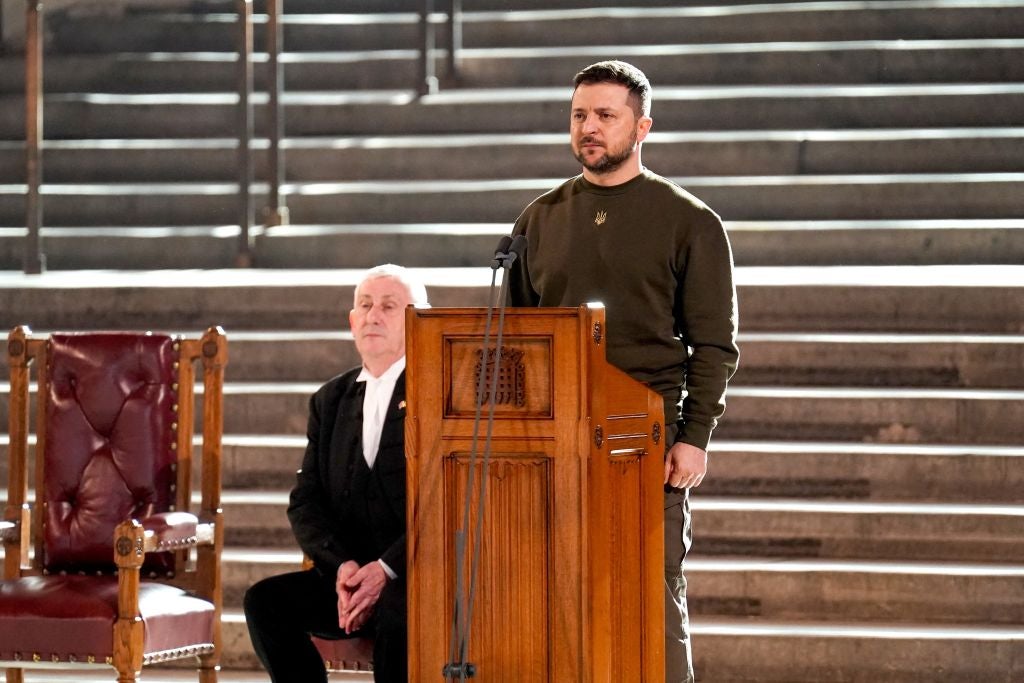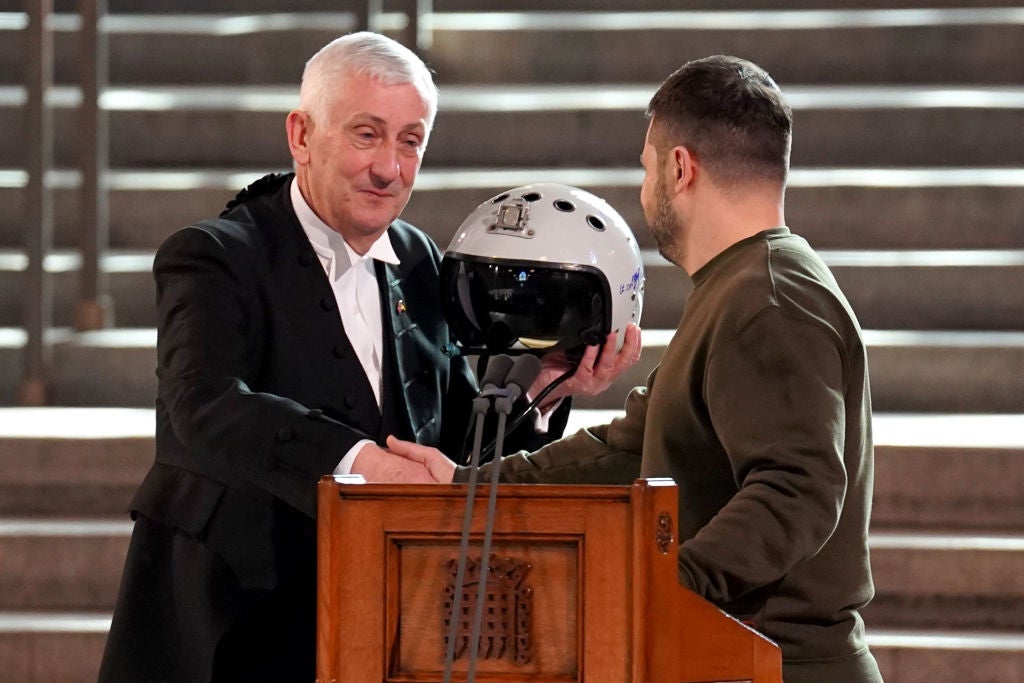
With the UK increasing its supply of lethal aid into Ukraine and preparing to train fighter jet pilots and marines, President Volodymyr Zelensky visited the UK on 8 February to meet with Prime Minister Rishi Sunak and address parliament.
Speaker of the House of Commons Lyndsey Hoyle introduced Zelensky’s speech to assembled parliamentarians at Westminster Abbey by recounting his first meeting with Ukrainian premier in 2020, over tea and cakes.
“Leaving British Parliament two years ago I thanked you for delicious English tea,” said Zelensky at the end of his audience with the House of Commons and House of Lords. “I will be leaving parliament today, thanking all of you in advance for powerful English planes.”
During the speech, Zelensky thanked Britain and the Prime Minister for support in building a coalition of NLAWs, Javelins, artillery rounds and air defence, and for the training of service people both before the invasion and today, including with the Challenger main battle tank.
“We have Freedom. Give us wings to protect it.”
At this point Zelensky made a gift of a signed pilot helmet to the Speaker of the House of Commons. “It is the helmet of a real Ukrainian pilot,” explained Zelenskyy. “The writing on the helmet reads: ‘We have freedom. Give us wings to protect it.’

“I trust this symbol will help us for our next coalition: coalition of the planes. And I appeal to you and the world with simple and yet most important words. ‘Combat aircrafts for Ukraine. Wings for freedom.’”
While the likelihood his faith will be rewarded with combat aircraft remains uncertain, one western official remarked: “Never underestimate a Ukrainian,” adding “I don’t think I have ever seen a leader resonate so globally.”
UK military support for Ukraine
To counter Russia’s expected spring aggression, the leaders of the UK and Ukraine will discuss a two-pronged strategy to UK assistance for Ukraine: an urgent influx of military equipment along with enhanced long-term backing.
The UK Prime Minister, Rishi Sunak, has proposed increasing the UK’s training offer for Ukrainian soldiers to include fighter jet pilots, as a guarantee that Ukraine will have the means to protect its skies for the foreseeable future. The training is expected to prepare pilots for NATO combat planes including the Saab Gripen, F-16 and possibly the Tranche 1 Eurofighter Typhoons.
Additional training for 20,000 Ukrainian soldiers will be provided this year, on top of the 10,000 who have already been brought up to war readiness through a recruit training programme underway in the UK, with the scope of the initiative expected to expand in 2023.
The Prime Minister announced that this training will be expanded to include marines and fighter jet pilots “ensuring Ukraine has a military able to defend its interests well into the future”.
Further, Sunak reiterated the UK’s “commitment to stand shoulder-to-shoulder with Ukraine for years to come”, beyond providing military weaponry in the short term.
“The UK will also announce further sanctions today in response to Russia’s continued bombardment of Ukraine,” said Sunak, “including the targeting of those who have helped Putin build his personal wealth, and companies who are profiting from the Kremlin’s war machine.”
Zelensky’s plan for Ukraine’s reconstruction
Zelensky’s commitment to victory is a consistent part of the views he expresses, and that was no less clear today, even going as far as to describe what a victory would mean for the broader international community. He evokes a vision of a world “who does not allow perpetrators to enjoy immunity, who knows how to overcome veto when it’s abused”.
The implications of this language recall Zelensky’s demands to the United Nations Security Council to dissolve itself if cannot enact peacekeeping actions while Permanent Members, Russia and China, veto action.
Zelensky also addressed his vision for post-war era reparations via the Special Tribunal for the Crime of Russian Aggression against Ukraine and the Ukrainian Special Compensation Mechanism designed to “compensate war losses at the expense of Russian assets”, which he tied directly to the Ukrainian Peace Formula supported by the UK.
“Justice is one of ten elements of the peace formula proposed by Ukraine and supported by Britain. I thank you for your readiness to invoke the formula,” he said.
During the UK Prime Minister’s questions on 8 February the leader of the opposition Labour Party Keir Starmer raised the question of Justice for Ukraine after the conclusion of the Invasion. “Does the Prime Minister agree with me that when the war in Ukraine is over, Putin and all his cronies must stand at The Hague and face justice?” Starmer asked.
Sunak responded that he had discussed the matter with Zelensky and through the UK’s support of the International Criminal Court he is hopeful to see the first indictments very shortly.
He went on to assure the house that the Government is working with international partners throughout the legal process to use state sanctioned assets to fund the Ukrainian reconstruction.



